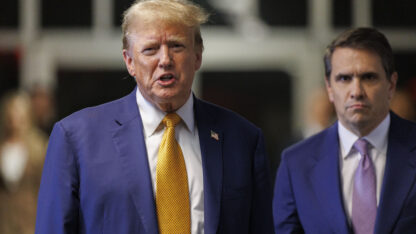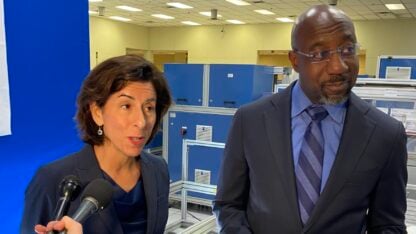100 Days For Georgia’s ‘Majority Maker’ Senators

President Joe Biden came to Georgia to celebrate his first 100 days, alongside Georgia Senators Jon Ossoff and Raphael Warnock.
Emma Hurt
President Joe Biden visited Georgia to mark his first 100 days in office and to celebrate Georgia voters for electing Sens. Jon Ossoff and Raphael Warnock in January. The two senators handed Democrats a razor-thin majority in the chamber, enabling Biden to pass his massive coronavirus relief package.
Biden’s decision to highlight Georgia, Ossoff and Warnock is another example of how the freshmen senators have been able to hold far greater influence than others in their position traditionally might, because of their landmark victories.
“It’s like when the new kid comes to school, but the new kid also just happened to help the team win the national championship right as they arrive,” said Josh Delaney, Warnock’s legislative director.
“We’re the majority makers in the Senate,” said Lawrence Bell, Warnock’s deputy chief of staff and senior advisor.
“There comes one, some responsibility with that, and two, a real appreciation from the senators’ colleagues and their offices, which has allowed us the platform to be more engaged in important legislation,” Bell said.
They had only been in Washington a few weeks when Senate Majority Leader Chuck Schumer held a press conference just for them, thanking Georgia voters for allowing the Senate to be close to passing the COVID relief package.
“That is a very, very big deal and something you don’t see very often,” said Rey Benitez, Jon Ossoff’s chief of staff of the press conference. “The Senate is a place that operates by seniority. And usually, if you’re the 99th senator or the 100th senator, you might not have as much leverage or influence over legislation that is being considered on the Senate floor. This was not true for Sen. Jon Ossoff.”
Not your typical billing for two freshman Senators.
“Georgia we need you!” Biden says before leaving the stage. #gapol pic.twitter.com/jDCM9jqPqE
— Emma Hurt (@Emma_Hurt) April 29, 2021
“I really actually think by institutional standards, they have more influence than other freshmen senators have or would have, under these circumstances,” confirmed Chris Grant, a political scientist at Mercer University.
Grant attributed it, in part, to the fact that the new senators’ politics are more “in step” with progressive Democratic leadership than other southern senators, and past Democratic Georgia senators, who were more centrist, in line with their electorate.
“Typically, Georgia’s Democrats have been out of the mainstream of a progressive leadership,” he said.
Delaney said this has been the first time Senate Majority Leader Schumer “got to hear from members of his caucus, on what folks in Georgia want. And that matters.”
He said it has meant the caucus is “thinking differently about what does it mean to have to really have to engage with and deliver for communities in the south that some folks had written off.”
Ossoff and Warnock’s staff attributed the progress they’ve made in their first 100 days both to the historic, high profile wins, but also to a commitment by the senators themselves to get things done quickly.
Benitez pointed to Ossoff’s quick work in breaking a stalemate over a trade dispute that was threatening the future of a massive electric vehicle battery plant in Commerce, Ga., as well as his influence with Senate leadership to push certain priorities, including infrastructure.
“Sen. Ossoff talks to leadership constantly, and he advocates for everything that Georgians need,” Benitez said.
Delaney highlighted Warnock’s immediate advocacy for $5 billion in aid for farmers of color in the coronavirus relief package as evidence of his effectiveness.
“ I don’t think I’ve ever seen something go from idea to law that quickly,” he said.
While other members had laid the groundwork on the issue, Delaney said, “It just took someone like Sen. Warnock to be in the right place to and be able to use the fact he was in the right place to deliver on that.”
And, Grant pointed out, there’s the sheer visibility Ossoff and Warnock have after their extremely high-profile runoff victories with unprecedented spending and scale.
“These two senators were elected in such a high profile way simultaneously, that they’re much better known than probably any other freshmen in the entire Congress,” he said.








